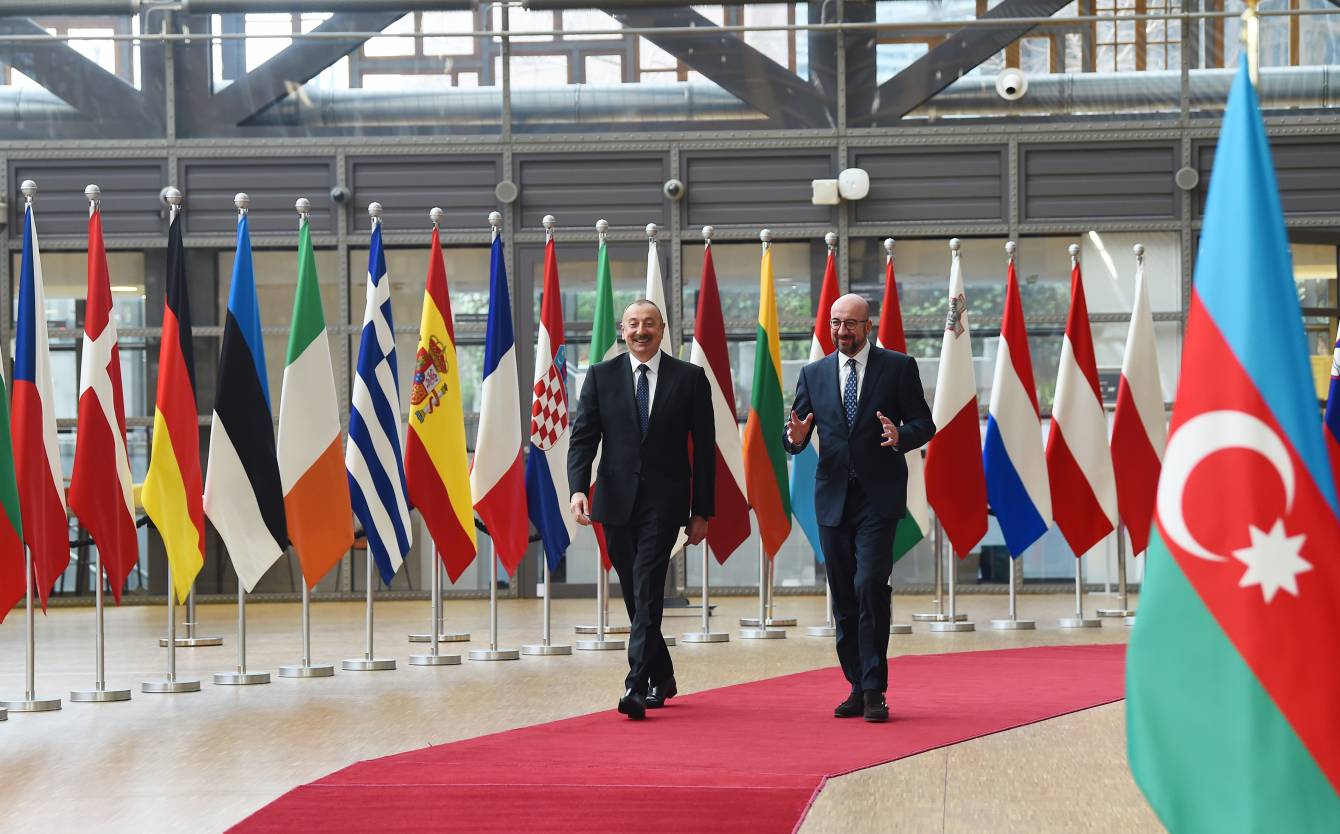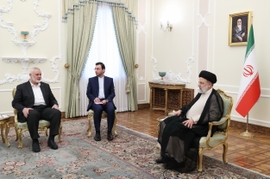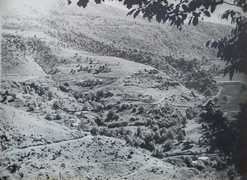Baku has determined the composition of the national commission for delimitation and demarcation of the state border between Armenia and Azerbaijan.
The announcement was made by Azerbaijan’s President Ilham Aliyev during a phone conversation with the European Council (EC) President Charles Michel.
According to the president, the composition of a delegation that should draft the peace agreement between the two countries was also determined.
“The President of Azerbaijan noted that […] Azerbaijan was ready for negotiations with Armenia in the “Baku-Yerevan” format,” the press service of the Azerbaijani president said in a statement on Saturday.
“President Ilham Aliyev stressed the importance of taking into account the five principles presented by Azerbaijan for negotiations on a peace agreement.”
On April 6, Charles Michel hosted a meeting between President Ilham Aliyev and Armenian Prime Minister Nikol Pashinyan in Brussels. The sides agreed to convene a Joint Border Commission that would delimit the bilateral border between Azerbaijan and Armenia and ensure a stable security situation along and in the vicinity of the borderline.
According to the agreement, the two countries’ foreign ministries should also prepare a peace treaty to resolve all mutual interest issues.
Earlier this year, the Azerbaijani government submitted to Armenia a proposal package containing five basic principles to normalize bilateral relations after nearly thirty years of impasse due to Armenia’s illegal occupation of the Azerbaijani lands. The principles highlight the key issues related to the peacebuilding efforts of Azerbaijan, including the mutual recognition of territorial integrities, the inviolability of internationally-recognized borders and the absence of territorial claims against each other. In addition, the principles call for refraining from the use of force in inter-state relations, delimitation of state borders, and unblocking of regional communications.
President Aliyev has recently said that the Armenian authorities have accepted the principles put forward by Baku.
“The Armenian leadership has officially stated that it recognizes the territorial integrity of Azerbaijan and has no territorial claims to Azerbaijan and will not do so in the future. This is an essential moment for the post-conflict period, and we intend to conduct further negotiations based on these five principles,” President Aliyev said at 5th Congress of World Azerbaijanis in Shusha.
He added that the submission of principles reflected Azerbaijan’s good intention and foresight for establishing relations with Armenia, including diplomacy. The Azerbaijani president also said the “revengeful forces” in Yerevan should remember that this is the only way out for Armenia.
“If they refuse, we will not recognize the territorial integrity of Armenia either and will officially declare that,” President Aliyev said.
Meanwhile, Nikol Pashinyan said he ruled out signing a document with Azerbaijan without extensive public discussion, including the Armenians living in the territories of Azerbaijan temporarily monitored by Russian peacekeepers.
The 2020 war between Armenia and Azerbaijan in the latter’s Karabakh (Garabagh) region ushered in an all-new era in South Caucasus. Azerbaijan restored control over a significant part of its border with Armenia, measuring 1,007 kilometers in length after nearly 30 years since the region fell under the illegal Armenian occupation in the early 1990s.
Following the dissolution of the Soviet Union in 1991, Armenia launched full-blown military aggression against Azerbaijan, marking the longest and deadliest war in the South Caucasus region. The bloody war ended with a ceasefire in 1994, which saw Armenia forcibly occupying 20 percent of Azerbaijan’s internationally recognized territories. Over 30,000 Azerbaijanis were killed, nearly 4,000 went missing, and one million were expelled in a brutal ethnic cleansing policy conducted by Armenia.
On September 27, 2020, the decades-old conflict between the two countries intensified after Armenia's forces deployed in occupied Azerbaijani lands shelled military positions and civilian settlements of Azerbaijan. During counter-attack operations that lasted 44 days, Azerbaijani forces liberated over 300 settlements, including the cities of Jabrayil, Fuzuli, Zangilan, Gubadli, and Shusha, from nearly a 30-year-long illegal Armenian occupation. The war ended in a tripartite statement signed by Armenia, Azerbaijan, and Russia on November 10, 2020. Under the statement, Armenia also returned the occupied Aghdam, Kalbajar, and Lachin districts to Azerbaijan.







 Iran's senior military leaders described the drone and missile attack on Israel on April 14 night as “successful".
Iran's senior military leaders described the drone and missile attack on Israel on April 14 night as “successful".
 The number of evacuees from flooded areas in Kazakhstan has reached 97,852 people, including about 32,856 children since March 27.
The number of evacuees from flooded areas in Kazakhstan has reached 97,852 people, including about 32,856 children since March 27.
 Iran's President Ebrahim Raisi extended condolences to the Chairman of the Political Bureau of the Palestinian Hamas group, Ismail Haniyeh, followi...
Iran's President Ebrahim Raisi extended condolences to the Chairman of the Political Bureau of the Palestinian Hamas group, Ismail Haniyeh, followi...



